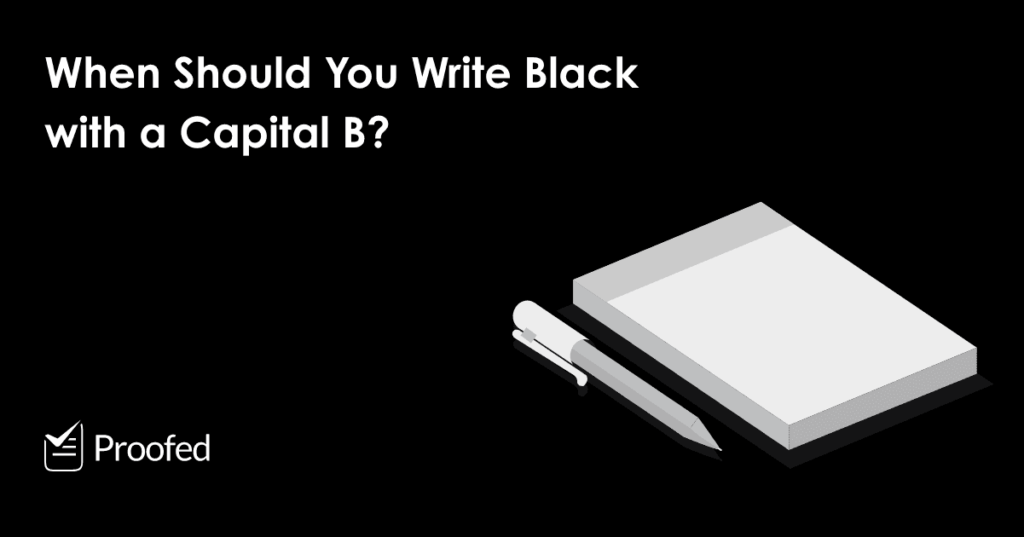The capitalisation of ‘Black’ has been a topic of much debate recently. But why is this? And should you write ‘Black’ with a capital ‘B’ in racial or ethnic contexts? Or is it better to stick to ‘black’ in your writing? Let’s take a look.
Should You Capitalise the ‘B’ in ‘Black’?
For many years now, campaigners and experts have argued that we should capitalise ‘Black’ when referring to people or cultures from Africa or the wider African diaspora. But the issue has only recently become mainstream, with various style guides and publishers changing policy.
This trend to capitalise ‘Black’ is related to the wider push towards social justice for Black people and the Black Lives Matter movement, especially in the USA. In this context, capitalising ‘Black’ helps us to:
- Acknowledge the social identity and culture of the African diaspora.
- Prevent ambiguity between this sense of ‘Black’ as a cultural and social identity and other uses of ‘black’, such as to refer to the colour.
In the first case, we capitalise ‘Black’ to recognise its use to refer to a large social group, just as we have long done for ‘Asian’ or ‘Hispanic’. And while other, narrower terms exist (e.g. African American in the USA), ‘Black’ is inclusive of a wide range of related ethnicities and cultures across the globe.
The issue of ambiguity, meanwhile, is a practical one. For instance, if we write ‘black hair’, it isn’t necessarily clear whether we mean ‘hair that is the colour black’ or ‘hair of a type associated with people from the African diaspora’. But by capitalising ‘Black’ when referring to race, ethnicity or culture, we can immediately remove this ambiguity.
Thus, there are clear benefits to writing ‘Black’ with a capital ‘B’ like this when you’re referring to Black people, cultures, or communities.
How About ‘White’?
This leads to another question: If we capitalise ‘Black’ when referring to race, should we do the same for ‘White’? Or should we stick to ‘white’?
This is a tricky question, with different people and style guides recommending different approaches. Some publishers are cautious about capitalising ‘White’ as this has long been associated with white supremacists. For instance, the Columbia Journalism Review has said:
Find this useful?
Subscribe to our newsletter and get writing tips from our editors straight to your inbox.
[W]e capitalise ‘Black’, and not ‘white’, when referring to groups in racial, ethnic, or cultural terms. For many people, ‘Black’ reflects a shared sense of identity and community. ‘White’ carries a different set of meanings; capitalising the word in this context risks following the lead of white supremacists.
Others, like the New York Times, claim that ‘white’ does not capture a shared cultural identity like ‘Black’, so it does not warrant capitalisation.
The APA, though, suggests capitalising both ‘Black’ and ‘White’ when referring to racial and ethnic groups. And this clarity and consistency has definite merits, especially in academic writing.
Thus, the best approach may depend on what you are writing. If capitalising ‘White’ will help ensure clarity, or if your style guide suggests doing so, this is fine. But keep in mind that ‘White’ with a capital ‘W’ has negative associations for some, so you may want to think about your readers as well.
Summary: When to Write ‘Black’ with a Capital ‘B’
In line with current conventions, we suggest:
- Capitalising ‘Black’ in racial, ethnic, and cultural contexts.
- Using a lowercase ‘b’ in other contexts, such as for the colour black.
This will help ensure your writing is inclusive, acknowledging ‘Black’ as an identity that is importantly distinct from our other uses of ‘black’ in English.
However you capitalise ‘Black’ and ‘White’, though, make sure to be consistent! And if you’d like any help, we have proofreaders available 24/7.
